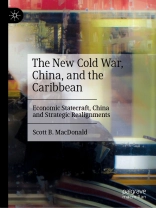This book examines the slide into a new Cold War in the Caribbean. The primary argument is that the Caribbean’s geopolitics have shifted from a period of relative great power disinterest in the aftermath of the Cold War to a gradual movement into a new Cold War in which a global rivalry between the U.S. and China is acted out regionally. The result of this is a gradual polarization of countries in the Caribbean as they are increasingly pressured to choose between Washington and Beijing (this being very evident during the Trump years). It can be argued that the U.S. focus on the Caribbean in the late 1990s through the early 21st century diminished, leaving the region open to a China ready and eager to do business and guided by a diverse set of objectives. The book brings the reader into a discussion on international relations with a main focus on U.S.-Chinese relations being played out in the Caribbean, an important strategic region for the North American country.
Inhaltsverzeichnis
Chapter 1: Introduction.- Chapter 2: China’s Caribbean Adventure.- Chapter 3: China, Venezuela and Cuba – The New Cold War.- Chapter 4: China and the English-Speaking Caribbean and Suriname.- Chapter. 5: Caribbean Views of the new Geopolitical Landscape.- Chapter 6: The Long China-Taiwan Duel: Caribbean Echoes.- Chapter 7: Realignments, Tensions and Asymmetry: Russia and Iran.- Chapter 8: Europe and Canada – the Caribbean Relations and the New Cold War.- Chapter 9: U.S. Policy in a Choppy Caribbean Sea.- Chapter 10: Conclusion: Policy Options in Geopolitically Tumultuous 2020s
Über den Autor
Scott B. Mac Donald is the Chief Economist for Smith’s Research & Gradings, a Global Americans Research Fellow, and a founding member and Fellow of the Caribbean Policy Consortium.












